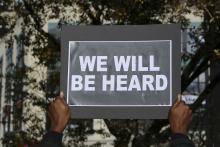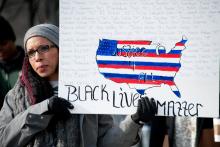#blacklivesmatter

The zeitgeist is clear. Much like Emmett Till’s murder in 1955 sparked the civil rights movement, the tragic string of murders of blacks in 2014 catalyzed another movement, the #BlackLivesMatter movement. This movement picks up where the civil rights movement left off, addressing systemic racial injustice in the legal and penal system, educational system, and economic system. In some ways, the battles we fight are more challenging than the ones our grandparents fought. Undeniably, we face off in a more complex world and against forms of systemic racism that are so subtle that they are almost invisible. Nevertheless, due to a unique combination of gifts and experiences, I’m hopeful that my generation of black millennials is ready to lead us on to a more equitable society. Here’s why.
1. We are propelled by the prophetic legacy of the past.
With a technological savvy that gives us unprecedented access to the true history of our people, and as perhaps the last generation to breathe the same air as the civil rights generation, we draw upon the legacies of the past as we move forward. When I sense that my capacity to forgive is waning, I recall my recent conversations with several survivors of the 16th Street Baptist Church bombing in Birmingham, Ala., and I’m reminded of the inner healing that forgiveness promises. When I am tempted to pander to the powers that be, I call my radical granddad and ask him to tell me again about the many Black Panthers meetings that took place at the church he pastored in Berkeley, Calif., in the 1960s. When I feel that I’m losing my courage, I read Ida B. Wells’ autobiography and am reminded that we are not alone. We are connected — part of a chain of black activists, each generation inspiring the next. Our heroes guide us every day.

I cringed. Recently, I sat watching a cable news broadcast — can’t remember which one. What I do remember is it featured people doing good in the world … and it made me cringe.
Lots of people were highlighted, but the two young black people they featured both shared the same general narrative: So and so had a hard life. He came from poverty. She came from abuse or neglect. But they rose above. Now look at all they’ve accomplished. It was striking. None of the stories of white people started with this narrative. Rather, theirs usually went something like: Little Suzy or Johnny took a class project and turned it into a major non-profit that helps thousands of orphans … in Africa.
No matter where you tuned into this broadcast, blackness unconsciously was associated with hardship and overcoming while whiteness was associated with genius and compassion.
I sat there thinking: The truth is we have had centuries of hardship to press through. Our history is present, the good and the bad. As in Toni Morrison’s Beloved, the ghost of slavery haunts us. It affects our present. But it’s not just the past that haunts us. It is the same basic oppression of yesteryear —confinement, control, and disregard for black lives. So, it makes sense that the stories of our overcomers are as potent in current-day narratives as they are in history.
Jackie Robinson, Joe Lewis, Paul Robeson, Zora Neale Hurston, Billie Holiday, were the overcomers of our past. The black children in that broadcast were the overcomers of our present.
But what about the black future? One hundred years from now, will my family’s descendants still have to watch featured stories of black people doing good that always begins: So and so had a hard life?
During Black History Month we typically look back on all the accomplishments of those who paved the road for generations to come. But this month, we have been inspired by the #BlackLivesMatter movement to look forward to another kind of future for black men, women, and children.

The lives of widows and orphans mattered. In Exodus 22:22 God tells Israel, “You shall not abuse any widow or orphan.” God was so concerned for the widow and orphan that the law provided for their care. It was mandated that grain be left behind for them during the harvest and along the edges of the fields (Deuteronomy 24:19-21, Leviticus 19:9-10). Failing to provide such care provoked God’s wrath.
Why this penchant for the widow and orphan? Did God value them more than anyone else in society? No. The Bible says that God shows no partiality (Acts 10:34). Yet, God does show compassion and concern for those who are most vulnerable. God lifts up the plight of the last and the least because they are at the greatest risk. And given this concern, God requires that we take special care so that these vulnerable, tender members of society are not neglected and forgotten. To take them for granted, to forget or abuse them invites God’s anger that their plight might become ours.
If we were to cast this concern into today’s context, I believe that God would assert that Black Lives Matter in the same way that the lives of widows and orphans mattered. Black lives matter because blacks, suffering numerous disparities that serve to disadvantage, are vulnerable in society.


The real war on terror is not a war on Western values or American values. It is evil perpetuating crimes of power and control, and its costs are measured in real in human lives. Those lives are largely black and brown, and the focus on the danger to America with its resulting protectionism and cultural-centrism is endangering lives long term.
Church, let us not join in the narrative of self-preservation. Let us not value those who look and think like our own community more than those who are culturally different. Let us not value the wealthy more than the impoverished. Let justice-speech ring from our pulpits, and let love for the culturally different be reflected in our prayers and our financial endeavors. For the world to hear that in Christ all lives matter, we the Body must speak loudly and demonstrate that #blacklivesmatter #brownlivesmatter.

I grew up in a household run by a woman of the civil rights movement. My mother, born Sharon Lawrence in 1948, was a teenager when she joined the Student Non-Violent Coordinating Committee in 1966, one year after Dr. King’s legendary march from Selma to Montgomery and President Lyndon B. Johnson’s passage of the 1965 Voting Rights Act. With the foundations of progress and protection laid, there was still much work to be done. My mother was based in Philadelphia, where she helped establish one of SNCC’s embattled northern offices.
A few years back, as I fished through boxes brimming with old papers and notepads, I discovered handwritten notes from James Forman to my mother. Forman offered detailed instruction to the then 18-year-old young woman who would become my mother only a few years later. Her job was much like mine is now: church outreach. The way she tells it, there were only a few churches in Philadelphia willing to offer their pulpits for movement people to speak. It was her job to secure those pulpits when giants like Forman, Stokely Carmichael, and others came to town.
I grew up aware of the women of the civil rights movement — my mother was one of them.
Perhaps that’s why I was so struck by the rare effort made by the film Selma to highlight the roles of women in that struggle, which by many accounts was the high-water mark of the civil rights movement.

There’s this microaggression happening online, offline, and all around that has a nice sentiment, but really needs to stop. Can we call for a week-long moratorium on decrying “ALL LIVES MATTER?”
This is a request specifically for my white brothers and sisters, especially those in the church.
I, of course, as a white heterosexual married middle-class highly educated American male, believe that all lives matter. It’s something I’ve been fighting for my entire adult life. Whether it is the mother infected with HIV by her wayward husband in western Africa, whether it is the undocumented immigrant father who may be separated from his American-born children, whether it is the NRA card-carrying white uncle who does an honest job and is a good neighbor back in the midwest, whether it is the homeless thirty-something woman coming off a bad meth addiction but needing shelter during a difficult winter, of course, by all means, every life matters.
Your life matters. My life matters. All lives matter.
This is a non-negotiable. This is true. This is what it means to be made in the image of God, as we’re told in the Book of Genesis — everyone, whether you’re white, black, brown, male, female, straight, gay, bisexual, transgender, Republican, Democrat, rich, poor, nice, kind of a jerk, young, old, middle-aged, we all matter.
But these past couple weeks — these past four months, five months, 22 months? — it’s important that we stand with the ever-growing chorus and declare, yes, black lives matter. With the heartbreaking, soul-wrenching death of Michael Brown, the news just yesterday of another non-indictment in the death Eric Garner, or the dark night when Trayvon Martin was shot down in Florida, a chorus of voices has risen to declare with one voice and hashtag that #BLACKLIVESMATTER.